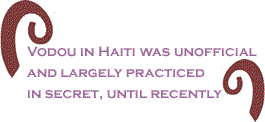|
In
celebrating Black History Month is year I want our West
African ancestral religious contributions to also be lifted
up. One of them for me, as a lesbian, is the contribution
of Vodun.
 Why? Why?
Because
of its spiritual tenets of acceptance
of all people of all sexual orientations and gender expressions.
As
one of the religions brought to the New World by the African
Diaspora, there is no religion that frightens and fascinates
the world over as Vodou.
Misconstrued
by racist images, of zombies rising from graves, jungle
drums, orgiastic ceremonies
ritualizing malevolent powers of black magic, and engaging
in cannibalism, by today�s popular culture images
courtesy of Hollywood�s and New Orleans� tourism industries,
Vodou is a persecuted religion.
But
Haitian Vodou is an ancestral folk religion whose tenets
have always been queer-friendly.
Ironically,
homosexuality has been legal in Haiti since 1986. But few
protections and provisions come with it. For example, same-sex
marriage, and civil unions are not recognized. It�s unclear
whether LGBTQ couples can adopt children or have custody
of their own children. LGBTQ Haitians don�t openly serve
in the military. They don�t have an anti-hate crime bill
that specifically addresses discrimination and harassment
LGBTQ Haitians face on the basis of their sexual orientation
or gender identity.
Minimally,
LGBTQ Haitians are protected under its Constitution as stated
in Article 35-2 that prohibits discrimination in the workplace
based on, �sex, beliefs, opinions and marital status.� And
the United Nation�s International Bill of Human Rights mainly
protects LGBTQ Haitians. With no queer enclaves in Port-au-Prince
and other big cities throughout Haiti, many LGBTQ Haitians
are left puzzled by what it means that homosexuality is
legal in their country.
However,
as in all repressively homophobic cultures, LGBTQ people
have always found ways to express and to live out their
true authentic lives.  In
Haiti, how openly queer you are depends not only on your
class, profession and skin complexion, but also your religious
affiliation. In
Haiti, how openly queer you are depends not only on your
class, profession and skin complexion, but also your religious
affiliation.
In
a country that is predominately Roman Catholic homosexuality
is condemned. But among Haiti�s LGBTQ middle and profession
classes they find ways to socialize out of the public �gaydar�
and with impunity.
For
example, in Petionville, an upscale suburb of Port-au-Prince
of mostly American and European whites and multiracial Haitians,
is where many LGBTQ people will informally gather for dinner
parties, at restaurants and beaches. The well-known 4-star
tourist hotel, the Hotel Montana in the hills of Petionville
that was recently destroyed by the quake, is one of the
hot spots. And these queers hold positions as government
officials, business people, NGO and UN aid workers.
For
the poorer classes of LGBTQ Haitians, however, who live,
work and socialize in one of the densely populated and improvised
cities like the capitol city of Port-au-Prince, discrimination
on the basis of their sexual orientation and gender expressions
is commonplace.
For
example, the 2002 documentary �Des Hommes et Dieux (Of Men
and Gods)� by anthropologist Anne Lescot exposed the daily
struggles of Haitian transwomen. Blondine in the film said,
�When people insult me because I wear a dress I am not ashamed
of how I am. Masisis (gay males) can�t walk down the street
in a wig and dress.�
But
with the ancestral religious belief that behavior is guided
by a spirit (loa), gay males in Haitian Vodou are under
the divine protection of Erzulie Freda, the spirit of love.
And as a feminine sprit, gay males are allowed to imitate
and worship her. And lesbians (madivins) are considered
to be under the patronage of Erzulie Dantor, a fierce protector
of women and children experiencing domestic violence. Erzulie
Dantor is bisexual, but she prefers the company women.

As
a monotheistic religion, Vodou believes in one God, but
many spirits called �lwas� that have both dark and light
sides. The spirits �lwas� are the varied expressions of
God in the world, and these spirits oversee all human activities
by forming connections between the material world people
live in and the spiritual world they derive from.
Two
different forms of Vodou exist. While it is true that Vodou
evolved in New Orleans at the same time it was taking shape
in Haiti, New Orleans� Vodou, known as the Vodou capital
of the U.S., was not suppressed and allowed to flourish
between both its black and white citizens.
Haiti�s,
however, was not.
And,
hiding itself behind the trappings of Catholicism, Vodou
in Haiti was unofficial and largely practiced in secret,
until recently.
Why
Vodou as a religion many people ask?
Vodou enables
Haitians to connect and preserve their West African heritage,
to link to their ancestral spirits who affect everyday events
of their lives, and to bond with their local communities.
And
poorer classes of LGBTQ Haitians have at least two ways
to openly express and celebrate who they are - in Vodou
and in Rara festivals.

At
Rara Festivals, a yearly festival that begins following
Carnival, belongs to the peasant and urban poor of Haiti.
The Rara bands come out of Vodou societies that have gay
congregations where gay men are permitted to cross-dress
with impunity.
BlackCommentator.com
Editorial Board member, the Rev. Irene Monroe, is a religion
columnist, theologian, and public speaker. She is the Coordinator of
the African-American Roundtable of the Center for Lesbian and
Gay Studies in Religion and Ministry (CLGS) at the Pacific
School of Religion.
A
native of Brooklyn, Rev. Monroe is a graduate from Wellesley
College and Union Theological Seminary at Columbia University,
and served as a pastor at an African-American church before
coming to Harvard Divinity School for her doctorate as a
Ford Fellow. She was recently named to MSNBC�s list of 10 Black Women You Should Know. Reverend Monroe is the author
of Let Your Light Shine Like a Rainbow Always: Meditations on Bible
Prayers for Not�So�Everyday Moments. As an African-American
feminist theologian, she speaks for a sector of society
that is frequently invisible. Her website
is
irenemonroe.com.
Click here
to contact the Rev. Monroe.
|

